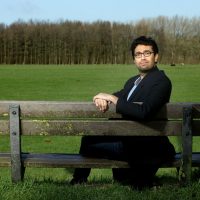Arranged marriage
Vishal Onkhar examines the complex web that is the institution of arranged marriage in India, which also has an impact in the Netherlands and TU Delft.
Vishal Onkhar examines the complex web that is the institution of arranged marriage in India, which also has an impact in the Netherlands and TU Delft.

(Photo: Sam Rentmeester)
English only
What image does the term ‘arranged marriage’ evoke? An archaic ritual where young children are betrothed? Or a contemporary scenario where an almost 30 year old individual succumbs to parental pressure to marry a stranger? Popular television shows like Indian Matchmaking paint it as an elite, ethnic dating service that offers its clients complete agency. The reality, however, is far more complicated. It’s often neither as liberal as such series portray, nor as regressive as meeting your spouse for the first time at your wedding, and it remains a labyrinth that many young adults must navigate.
Why is this relevant to modern Dutch society and its autonomous, individualistic dating and marriage habits? Because there are sizable immigrant diasporas here – people tracing descent from South Asia (including Suriname), the Middle East, North Africa, Southeast Asia etc., who grapple with this system to varying degrees. This includes many people at TU Delft – friends, classmates, colleagues, and even romantic partners! For many, it’s a source of considerable stress that threatens existing relationships, family ties, and general well-being.
The process initially unfolds similarly to a dating app. Just like an algorithm that tries its best to understand your preferences, you’re offered a few potential suitors by relatives or a professional matchmaker. Except, instead of a profile that you create and manage yourself, they use your biodata, a CV of sorts for marriage purposes. And much like filters on apps, suitors who match the following criteria are suggested – religion, race, caste, skin complexion, dietary habits, age, language, height, body type, education level, salary, assets, nationality, socio-economic status, family standing, and horoscopes.
Pre-marital relations are forbidden, breaking off engagements might cause a scandal
Problematic, demanding, and subjective conditions, to put it mildly, that can severely limit your options in countries with low populations. But when the stakes are as high as marriage, pre-marital relations are forbidden, breaking off engagements might cause a scandal, and divorce is a taboo, such pickiness on the family’s part can be understood, even if not condoned. And while it may be shocking to see such criteria formalized in the Indian arranged marriage context, many of them also remain unspoken filters used by people in the Netherlands (locals and expats alike) in dating and marriage.
The timelines of arranged marriages are also fast-tracked compared to regular ones. Where in the latter, a couple might date and co-habit for several years before deciding whether to get married, in the former there might be just three months separating the first meeting and tying the knot. This is often accompanied by subtle family pressure to make a swift decision on a suitor. Once both parties say yes, engagement and marriage ceremonies quickly follow.
A good comparison to today’s arranged marriages are the European royal alliances of the past. Marriages were often for family image, honour, status, and connections, with love being a fortunate, but not guaranteed, by-product. The practice wasn’t restricted to nobility; commoners were often expected to marry within their own church, with prohibitions against fraternizing with other religions, races, or even the same sex. A conversation with grandparents in the Netherlands might reveal that this wasn’t just a phenomenon of the distant past.
There is another side to this argument. Arranged marriages do sometimes genuinely work in happily bringing together people from similar backgrounds who might not have otherwise met. And the world of arranged marriages is changing, with individuals having more say in the process than ever before. There is also reason to believe that such unions are more lasting because of realistic expectations in partners and a greater willingness to compromise. In the end, it’s a dynamic cultural phenomenon that’s adapting to the times, and its true essence lies in the personal stories of those who traverse this path.
Vishal Onkhar is from Chennai, India and pursuing his PhD in Vehicle Engineering at TU Delft. He is an avid player of chess and video games, but he also harbours a soft spot in his heart for dancing and petting cats. He doesn’t drink coffee but good music and film have the same effect on him.
Comments are closed.